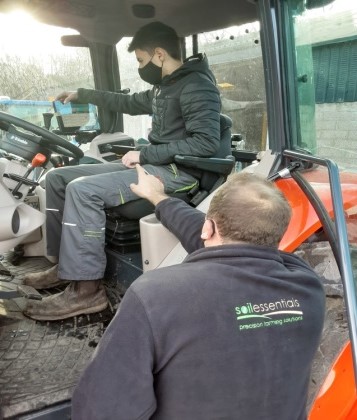SFC news published since 2018. See SFC archived content for earlier news articles.
SFC’s Morven Pritchard looks at how colleges have adapted to keep their College Innovation Funds on track despite the pandemic.


In the middle of March I was frantically organising the formal launch of the College Innovation suite of projects – we had planned to travel to our hosts Dundee & Angus College on the 18 March. As time and news of the pandemic and the imminent lockdown became ever more pressing our plans were swiftly changed; we postponed the planned ministerial visit and replaced it with a soft launch via social media.
Since the launch, the colleges involved have demonstrated that, even in the most difficult of circumstances, the sector is able to add significant value to Scotland’s economic future. The seven projects launched in March through the College Innovation Fund (CIF) cover a wide range of important economic and societal interests, from electric vehicle training, agriculture and precision farming through to the next revolution in manufacturing and digital health care. All the projects were chosen for being in line with both Scottish Government and SFC policy areas.
Forth Valley College’s Digital Health Induction Standards Course was the first in the suite to successfully launch and complete. This course was extremely timely in helping to train health care staff in using digital technology to enhance the experience of both users and care staff.
The launch event at Dundee & Angus College’s Landbased & Animal Care Project, which is predominantly around AgriTech and precision farming, was to have involved some of the cutting edge equipment the college bought with its funding. The photo at the top of this piece is of John Alexander, Level 5 full-time Agricultural Skills student. He’s just passed his tractor ticket and now has the skills to use the latest technology being fitted to commercial tractors, such as the field mapping and signal correction technology fitted to the College’s tractor. The trainer with John is Keith Sinclair, engineer and tractor technician at Brechin-based SoilEssentials.
Photo caption: John Alexander, Agricultural Skills, Level 5 full-time student with trainer Keith Sinclair, SoilEssentials’ engineer and Trimble technician.
 The CIF money also paid for 25 Android tablets. This has been especially beneficial for the 19 senior secondary school students on the project, helping them to understand the principles of AgriTech and precision farming through field mapping and recording data at The Glebe, the College’s smallholding. College Innovation funding has led to greater collaboration and support from local businesses in Dundee and Angus. Some businesses including Agrico, The Beef Box Company, SAC Consulting, SoilEssentials, Angus Soft Fruits and Lunan Bay Farm have been providing weekly presentations to the secondary schools’ classes. The College has subsequently entered into an arrangement with Lunan Bay Farm which has led to Lunan Farm goats grazing in The Glebe’s woodland.
The CIF money also paid for 25 Android tablets. This has been especially beneficial for the 19 senior secondary school students on the project, helping them to understand the principles of AgriTech and precision farming through field mapping and recording data at The Glebe, the College’s smallholding. College Innovation funding has led to greater collaboration and support from local businesses in Dundee and Angus. Some businesses including Agrico, The Beef Box Company, SAC Consulting, SoilEssentials, Angus Soft Fruits and Lunan Bay Farm have been providing weekly presentations to the secondary schools’ classes. The College has subsequently entered into an arrangement with Lunan Bay Farm which has led to Lunan Farm goats grazing in The Glebe’s woodland.
The CIF project at Borders College’s, A Garage for the Sea, has also made strides in its development. The completion of the marine training facility has been delayed by the pandemic. However, Borders College, in partnership with Argyll College, has been able to provide digital learning for the apprentices engaging in the Boat Building Course. The College has also created new working relationships with the Energy Skills Partnership, the Wind & Marine Training Network and British Marine, capturing interest from both national and international companies, as well as creating a platform of good practice with other colleges across the UK.
From one mode of transport to another, we recently published a blog from Glasgow Clyde College’s Electric Vehicle (EV) project describing how colleges are well placed to help meet the demands of the growing EV sector. Alongside the project at Glasgow Clyde College, we are funding a further two EV projects under this round of College Innovation funding. These are at Edinburgh College and Dundee & Angus College. All three projects now have even greater significance following the recent announcement that the sale of new petrol and diesel cars will be banned in the UK from 2030, 10 years ahead of the original target.
Finally, The West of Scotland College’s CIF initiative is aiming to keep ahead of the curve in the skills needed for the next revolution in manufacturing. Its Critical Engineer project is now delivering online events involving regional businesses and designed to gain insights into their future skill needs requirements.
It may not have been the year any of us expected, but colleges are well on their way to helping Scotland solve the challenges that lay ahead in skilling and re-skilling our workforces of the future.
Innovation is about improving what we do, and about exploring the possibilities of creating better products, processes and services. We hope to be able to celebrate the impact of each of these pioneering projects in the not too distant future.

